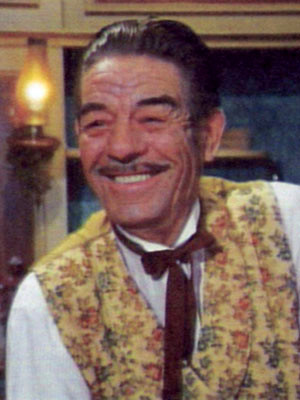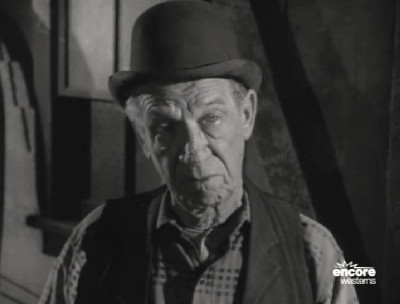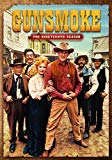| Reviews & Columns |
|
Reviews DVD TV on DVD Blu-ray 4K UHD International DVDs In Theaters Reviews by Studio Video Games Features Collector Series DVDs Easter Egg Database Interviews DVD Talk Radio Feature Articles Columns Anime Talk DVD Savant Horror DVDs The M.O.D. Squad Art House HD Talk Silent DVD
|
DVD Talk Forum |
|
|
| Resources |
|
DVD Price Search Customer Service #'s RCE Info Links |
|
Columns
|
|
|
Gunsmoke: The Complete Nineteenth Season
Nearing home plate, CBS/Paramount's Eighteenth and Nineteenth of 20 season sets of Gunsmoke (1955-1975) nearly finishes off the classic series. Many wondered if the label would complete the series before the DVD format went kaput, so their determination to see it through deserves our gratitude.
I've been reviewing Gunsmoke sets since the First Season was released in July 2007. The program was so prolific, upwards of 40 episodes per season in its early days, it's been impossible to watch everything in broadcast order. As new sets have been released, I typically watch 7-8 representative episodes then return to where I left off which, at present, is still Gunsmoke during its black-and-white years. Reviewing the later, color (and hour-long episodes) I initially expressed mild disappointment that they weren't as taut as the original, 30-minute version of the show, or that too much time in the hour episodes are allotted to character portraits played by guest stars rather than the series' regulars.
But around the 15th season mark Gunsmoke subtly transformed into more solid, more consistently satisfying program. Part of the reason was that the series gradually moved away, at least some of the time, from its TV-Western look, its obvious soundstage set of Dodge City's main thoroughfare most exemplifying this. By the time we got to seasons 16 and 17, the show not only went on location more, they actually went out-of-state occasionally, shooting in gorgeous locales that lend it, at times, the look of a big-budget feature film. Indeed, as these new video masters attest, Gunsmoke is often classically lush and handsome, with exceptionally good 35mm color photography.
This is especially astounding when one compares early-‘70s Gunsmoke to TV production methods today. A current show often costs $8-10 million per episode, with ten episodes per season. Gunsmoke in the early-‘70s probably cost in the region of $200,000 an episode or less, and the 24-episode seasons made for a brutal production schedule. Once Gunsmoke shifted from a half-hour to an hour format, it became impossible to prominently feature star James Arness in every episode - he would have dropped dead from exhaustion.
So, with the shift to the hour format, Gunsmoke became a quasi-anthology series, with many more episodes built around other characters living or passing through Dodge City. Those shows depended on the writing and producing end of things than the guest stars to carry the day. Some do, others failed. But by this point the show's producers seemed to have found ways around this. Instead of Arness making veritable extended cameos in some shows, he's better integrated into the stories even when his screen time is limited. Scheduling all this must have been a logistical nightmare. It required a careful balancing of scripts and probably multiple episodes shooting simultaneously, so that the main cast members weren't overworked, and could move easily from studio-shot scenes to locations far and wide.
Another reason Gunsmoke later seasons became so good has to do with its main characters (and many minor ones), some of which had been around since the start, while others had been a part of the Dodge City community for ten years or more. More about this below.
The series, the first "adult" Western when it debuted in 1955, was the number one show in the country during its third through sixth seasons, and remained in the Top Ten for the next two years. But the format changes and its graveyard timeslot (Saturday nights at 10:00pm) hurt the show, and by its twelfth season the show had slipped to 34th place in the ratings. CBS decided to cancel Gunsmoke, but viewer outcry and a famous intervention from the Gunsmoke fan and wife of CBS head William Paley earned Gunsmoke a last-minute reprieve (resulting in the cancellation of Gilligan's Island instead).
It proved to be one of the great comeback stories in the history of television: Gunsmoke moved over to Monday nights at 7:30pm (later 8:00pm) and once again became a Top Ten show for the next six seasons, peaking, incredibly, at #2 during the 1969-70 season. Further, Gunsmoke proved it was still more than capable of producing some of the best Western drama on television.


As before, most episodes' stories continue to revolve around one or more of the show's five principal characters: Dodge City's Marshal, Matt Dillon (James Arness); Matt's friend Miss Kitty (Amanda Blake), owner of the Long Branch Saloon; cantankerous Doc Adams (Milburn Stone); illiterate hillbilly Festus Haggen (Ken Curtis), Matt's backwoods assistant; and Newly O'Brien (Buck Taylor), Matt's more youthful, handsome deputy.
More so than in the earlier, half-hour Gunsmokes, one-shot characters played by guest stars assume larger roles in the teleplays. Matt, Kitty, Doc, and Festus were more often on the sidelines, with the guest characters conferring with one or more series stars for advice or asking for their help. Sometimes there would be medical issues requiring Doc Adams's services, other times there would be a legal dispute or criminal act compelling Matt to step in and help resolve, or maybe an old friend or relative of Kitty's or Festus's would turn up. Other shows, however, do focus on our leading characters.
Given that Gunsmoke ultimately resulted in an astounding 635 episodes, some repetition of story ideas was inevitable. My pal Jeff Flugel rightly observes that every time Kitty boards a stage headin' outta Dodge she'll almost certainly run head-smack into some life-threatening crisis, and that holds true for any train ride our characters take which, given that Gunsmoke's producers seem to have invested in a couple of train car sets, is more frequent in these later seasons.
Seasons eighteen and especially nineteen are really the beginning of the end of Gunsmoke, though quality-wise its scripts remain consistently good. During the 1972-73 season, it was still a Top Ten show, coming in at number eight. The following year it was a still-respectable 15th, ahead of popular shows like Happy Days, Barnaby Jones, and The Streets of San Francisco. However, the TV landscape was quickly changing. By '74-'75, sitcoms like All in the Family, Sanford and Son, and Chico and the Man began to dominate, though The Waltons cracked the Top 10 at number eight.
The bigger changes involved the cast. The nineteenth season would be Amada Blake's last. She'd grown weary of her limited role and was, after nearly two decades of Kittying, anxious to try something different. Except for a too-brief appearance in the 1987 TV movie Gunsmoke: Return to Dodge, that would be it for Blake. She died two years later after years of poor health and was one of the first Hollywood celebrities to die from AIDS complications.
Two leather-faced mainstays of Gunsmoke also bid adieu: Much-loved character actor Glenn "Pee Wee" Strange, Sam the bartender, had been with the series for a dozen years, beginning around 1961. He's fairly prominent in shows as late as "The Widowmaker," but by then was dying of terminal lung cancer and barely whispers a line or two in "The Hanging of Newly O'Brien," his last appearance and one of several that aired after his death in September 1973.
Hank Patterson had been with the show even longer, his first appearance dating back to 1959. He played a variety of roles before settling into the part of Hank, livery stable operator, which he played until "A Game of Death, An Act of Love" in 1973. Unusually, his other concurrent, continuing role was even more famous, as pig father Fred Ziffel on two other series: Petticoat Junction and, more famously, Green Acres. Patterson died at 86 in 1975.
Fine shows abound. Season 18's "Bohannan," casts Richard Kiley as a faith healer, whom Doc insists is a fraud doing more harm than good. The well-written show (with remarkably authentic period dialog) seems to be heading in an obvious direction but then turns surprising corners I won't reveal here.
Season 19's two-part season opener "Women for Sale" is an historically accurate account of the illegal white slave trade, done on a fairly epic scale, with James Whitmore guesting as the Irish-born leader of the heartless organization shipping (mostly) women across the border into Mexico. The episode features a surprising dramatic turn by Shani Wallis, wearing virtually the same costume she'd worn in Oliver! a few years before. Intriguingly, this episode features opening narration by William Conrad, radio's Marshal Dillon.
"Matt's Love Story," featuring Michael Lenard, is highly regarded, but I was equally taken with "The Widowmaker," guest-starring Steve Forrest as a legendary quick-draw trying to put that life behind him, only to be challenged by young gunfighters and disrupting the peace of Dodge, forcing Matt into an uncomfortable position. As with "Bohannan" this show could have resolved its dramatic conflicts in obvious, easy ways, but the intelligent writing keeps the viewer guessing.
The Season 19 finale, "The Disciple," might have served well as a series finale (something denied when Gunsmoke was abruptly cancelled). Matt's shooting arm is badly injured in a gunfight with bank robbers, so much so Doc warns him it might never fully heal. To everyone's shock Matt resigns and everyone gives his replacement (Paul Picerni) the cold shoulder. Matt leaves town and meets up with an army deserter, Lem (Dennis Redfield), a pacifist. The allusions to the Vietnam War and its deserters was a rare venture into topicality for the series, but it works.
Video & Audio
In color, Gunsmoke looks stunning on DVD, with rich color and excellent detail. The Dolby Digital mono (English only) is clean and clear, and the shows include optional English SDH subtitles. The packaging allows viewers to read the episode descriptions inside the snap case.
Extra Features
In a real pleasant surprise, CBS/Paramount have provided a really good, new extra. "Ben and Beckey Talk Gunsmoke" has Ben Costello and Beckey Burgoyne, authors of, respectively, Gunsmoke: An American Institution (a major reference for this writer) and Perfectly Amanda - Gunsmoke's Miss Kitty: To Dodge and Beyond discussing each season's high points and share other behind-the-scenes information. One only wishes these warm chats had been a part of the Gunsmoke releases from the start.
A real surprise is an archival audio commentary with James Arness (recorded in 2005) for "A Quiet Day in Dodge" on Season 18, while Costello and Jim Byrnes provide one for "Women for Sale" (Part 2) on Season 19.
Also included are episodic previews, generally in very poor condition, for most of the shows. As is commonly done, they're attached to each show separately rather than positioned so as to actually preview the next episode, which takes away from the fun. Photo galleries round out the supplements.
Parting Thoughts
Two more terrific rounds of great Western drama, Gunsmoke's eighteenth and nineteenth seasons aren't cheap, but provide many hours of quality entertainment well worth the price. Highly Recommended.
Stuart Galbraith IV is the Kyoto-based film historian largely absent from reviewing these days while he restores a 200-year-old Japanese farmhouse.
|
| Popular Reviews |
| Sponsored Links |
|
|
| Sponsored Links |
|
|
| Release List | Reviews | Shop | Newsletter | Forum | DVD Giveaways | Blu-Ray | Advertise |
|
Copyright 2024 DVDTalk.com All Rights Reserved. Legal Info, Privacy Policy, Terms of Use,
Manage Preferences,
Your Privacy Choices | |||||||












